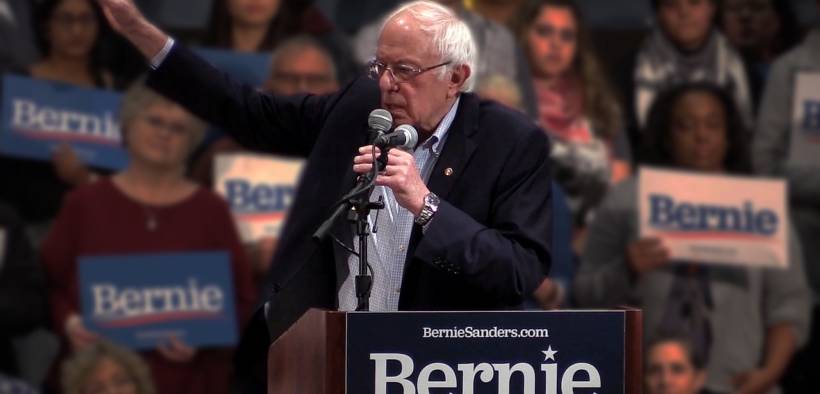Bernie Sanders Unveils Free Child Care Proposal

“We know that the first four years of a child’s life are the most important years of human development, so it is unconscionable that in the wealthiest country in the world, we do not properly invest in early childhood education.”
Democratic presidential candidate Sen. Bernie Sanders, D.-Vt., unveiled a child care proposal Monday. He has become notorious for his calls for a wealth tax during the campaign and said it would be an avenue to generate revenue for social programs and healthcare. Sanders’ plan calls for allocating $1.5 trillion over 10 years for child care.
Wealth Tax is the Answer
His campaign detailed specifics of the idea, which includes children up the age of four and guaranteed access to pre-kindergarten programs at the expense of the nation’s wealthy, Juan Perez Jr. reported for Politico.
“Childcare must be guaranteed for every child regardless of their parents’ income, just like K-12 education,” Sanders said in a statement. “We know that the first four years of a child’s life are the most important years of human development, so it is unconscionable that in the wealthiest country in the world, we do not properly invest in early childhood education.”
Sanders had previously advocated for such a plan, but had yet to reveal specifics until the announcement Monday. Notably, his plan calls for programs to operate for 10 hours a day and also cater to parents who do not work a 9-to-5 schedule.
While Washington would pick up the tab for child care programs, pre-K would be “locally administered.” Sanders environs the Departments of Education and Health and Human Services (HHS) to oversee the implementation of federally-funded child care.
Disabled children are not to fall by the wayside either. Sanders’ plan would allocate more funding for the Institute of Education Sciences to research educational methods to serve children with disabilities.
Sparking Industry Growth
If implemented, the idea of free universal child care would potentially double the total number of childhood educators to 2.6 million, Politico reported. The federal government would set minimum education qualifications for childhood educators: a Child Development Associate Credential for those providing direct services, associate’s degree for teaching assistants, and a bachelor’s degree in childhood education or child development for pre-K teachers.
Paired with Sanders’ call for free university tuition and an elimination of student loan debt, a free child care program could open the door to new employment opportunities. Sanders would also raise the salary level of child care workers to “a living wage.”
“Everybody knows the future is with our kids,” Sanders said at a rally in Houston. “And millions of families cannot find high-quality, affordable child care. Together we change that.”
Child Care or Tuition?
The national average for childcare in 2018 was between $9,000 to $9,600, Fortune reported. HHS considers child care expenses of 7% of family income to be affordable. However, many families spend considerably more and costs fluctuate depending on state.
Massachusetts reported the highest costs of childcare with center-based infant care costing $20,415 per year. Assuming a married couple meet the state median income level of $121,607, the family would be spending 16.8% of its income.
Child care expenses in 28 states were in excess of a year of public university tuition, giving some context to the problem. ChildCare Aware America reported 60% of expenses are paid out of pocket, with the remainder coming from state and federal funding.
Other Candidates Support Increased Spending
The federal government began funding the Child Care and Development Block Grant in 2008 with $5 billion per year until an increase in 2018. President Donald Trump signed a budget increase of $2.9 billion for both 2018 and 2019, according to the National Association for the Education of Young Children. The grant helps 1.4 million kids receive access to services, but 84-percent of eligible children still do not receive any assistance due to a lack of funding.
Trump repeatedly made remarks in favor of more child care funding.
“My administration wants to work with members of both parties to make childcare accessible and affordable,” Trump said in February 2017.
Sanders’ plan would alleviate the issue entirely, but it would rely on the successful passage of a wealth tax. Doing so is likely to be an uphill, partisan battle and it will likely not be an immediate solution.
Four other Democratic candidates favor increased funding for childcare. The plan of Sen. Elizabeth Warren, D.-Vt., most closely resembles Sanders’ by calling for a tax on millionaires, but stops short of providing free care for all children.
Pete Buttigieg advocated for a federal spending increase of $700 billion for “universal, affordable” care. Joe Biden only pledged to work with states to bring universal pre-K to all children while Sen. Amy Klobuchar, D.-Minn., simply called for a cost limit.
















People should be able to afford their own child care (translation: jobs and living wages). People then should not have children they can’t afford.
Bottom line: the human species is completely out of control, and always has been.